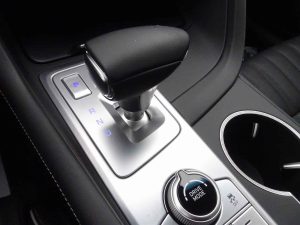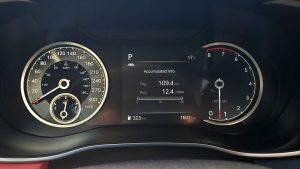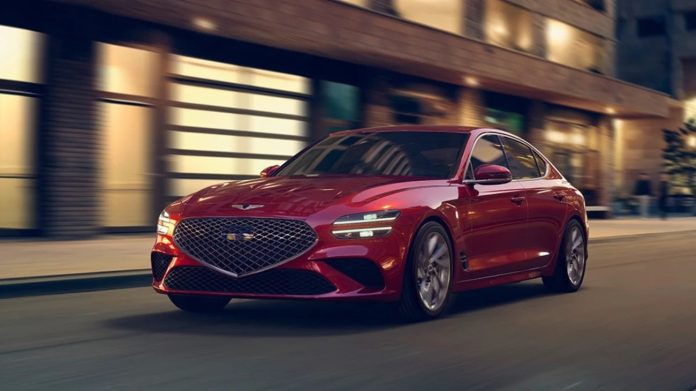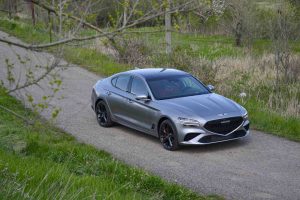Lexus understood the importance of value to people who bought luxury cars such as those made by Mercedes and BMW – back when Mercedes and BMW pretty much owned the luxury car market. Lexus acquired a large chunk of what had been their market – by offering luxury cars that were better values (and arguably, better cars) than those being sold at the time by Mercedes and BMW.
That was back in the late 1980s.
In the 2020s, it’s Genesis – Hyundai’s luxury car line – that is using the same strategy . . to snatch away market share from Lexus.
And the others, too.
The G70 is a compact-sized luxury sport sedan that competes with rivals like the Lexus IS, Audi A4 and BMW 3 Series, among others.
It is available with either a turbocharged four cylinder engine or a turbocharged V6 engine – either engine available with (or without) all-wheel-drive.
And for significantly less than rivals charge.
Prices start $37,775 for the base 2.0T trim, which comes standard with a turbocharged 252 horsepower 2.0 liter engine paired with an eight speed automatic transmission and rear-wheel drive. All-wheel-drive is available as a stand-alone option; so equipped the price rises to $39,875.
A top-of-the-line 3.3T Launch Edition comes with a 3.3 liter turbocharged V6 that makes 365 horsepower, also paired with an eight speed automatic. The rear-drive version stickers for $52,750.
With the optional AWD system the price rises to $54,750.
Cross-shops like the Audi A4 start at $39,100 – and that sum buys you a 201 horsepower 2.0 liter engine. Equipped with the optionally available 261 horsepower version of that engine, an A4 stickers for $41,200. The A4 isn’t available with a V6 engine (unless you opt for the high-performance S4 variant, which stickers for $51,900 (about $10k more than the MSRP of the V6-equipped G70).
The BMW 3 Series sedan’s base price is $41,450 ($43,450 with AWD).
And the Lexus IS300 – which comes standard with a 241 horsepower 2.0 liter four – lists for $38,625. The V6-equipped IS350 F-Sport lists for $43,050 – but its V6 makes just 311 horsepower (54 fewer than the turbo’d V6 in the G70 3.3T). 
What’s New
The 2022 G70 gets an exterior and interior styling refresh – but loses its formerly available manual transmission. Last year’s G70 was the only remaining luxury sport sedan that offered one (with the base 2.0 engine).
Sic gloria transit mundi.
There is also a new/updated 10.25 inch display at the top of the center stack.
What’s Good
More car (and engine) for less money than rivals in the class.
Among the most athletic cars in the class, irrespective of money.
Easy-to-use without having to look knobs and buttons for AC, stereo, seat heaters and other accessories.
What’s Not So Good
No more option to shift gears yourself.
Short “range” – due to small 15.8 gallon fuel tank and big thirst.
“Hands on” semi-automated driving technology sounds a lot like ice cream you’re not supposed to eat.
The G70 offers just about the strongest engine lineup in the class.
As its name suggests, the 2.0T trim comes standard with a turbocharged 2.0 liter four cylinder engine that’s similar – in terms of its size – to the 2.0 liter engines that are standard in most of the others in this class, including the BMW 3 Series, the Audi A4 and the Lexus IS300.
The difference is the power-for-your-dollar that comes standard in the G.
You get 252 horsepower vs. 201 in the A4 and 241 in the IS300. The BMW 3 sedan’s standard 2.0 liter four advertises 255 horsepower – putting it over the top by three horsepower vs. the Genesis. But each one will cost you about $1,200 (for a total of $3,675 – the difference in base price between the G70 2.0T and the BMW 330i).
If you’d like more power, the G70 3.3T comes standard with a 3.3 liter turbocharged V6 that advertises 365 horsepower (and 376 ft.-lbs. of torque). The Audi A4 doesn’t offer a V6 at all; the most you can get – without upgrading to the S4 – is a 261 horsepower version of the standard 2.0 liter four. Lexus offers a larger 3.5 liter vs. in the IS350 but it only makes 311 horsepower (and just 260 ft.-lbs. of torque, not being turbocharged) and that’ll cost you $700 for 54 fewer horsepower (and 96 less ft.-lbs. of torque).
BMW’s 3 sedan is available with a 382 horsepower 3.0 liter turbocharged in-line six, in the M340i. But the additional 17 horses will cost you about $726 each, for a total of $12,350 extra – the difference in price between the $54,700 M340i and the $42,350 G70 3.3T. 
Equipped with its standard 2.0 liter, 252 horsepower engine, the rear-drive version of the G70 takes about six seconds to get to 60. The slightly heavier AWD-equipped version takes slightly longer. To get to 60 much more quickly, the 3.3T is your ticket to ride. This one does the same run in 4.9 seconds, ranking it as just about the quickest car in the class. A BMW M340i is quicker (zero to 60 in a searing 4.1 seconds) but it’ll cost you $12,350 more to shave that eight-tenths-of-a-second off the time.
One area where this Genesis comes up a little short is range. Both of its engines are pretty thirsty – 17 city, 24 highway for the V6 – which seems even thirstier than that on account of the car’s 15.8 gallon gas tank. In city driving, you’ll drain it dry in about 268 miles.
Less, if you’re enjoying yourself. 
The others in this class have similarly small-capacity tanks but they generally average about 5 miles-per-gallon better than the G70, which gives them a significant range advantage.
But they do make you pay for it.
The G may cost you a little more in terms of how often you have to stop for gas. But it’s arguably a small price to pay for all the fun you’ll have in-between.
The G70 is not a Dad Bod car. This one’s as cut and ready for a ten-mile run as a Navy SEAL. Especially the Launch Edition, which looks even slinkier in its matte-finish paint job, hunkered down on 19-inch lightweight-alloy wheels, massive red-powder-coated brake calipers visible through the spokes.
Turn off the traction control (yes, you’re allowed), use your left foot to hold the brakes while easing into the fun pedal with your right. Feel the rear end squat and then slide left a little as the brawny engine overcomes the ability of the brakes to prevent the tires from spinning. Let them grease the road for a bit and then release the brakes and let her rip!
The limited slip diff straightens you out as the scenery blurs.
If you put the drive selector in Sport+ mode, each firm upshift of the eight-speed automatic at redline is accompanied by a pleasant eruption of combustion from the Variable Valve exhaust system. Genesis assumes that if you buy a car like the G70, you’d like to hear it.
And control it.
Though each one is equipped with all the very latest saaaaaaaaaafety and “advanced driver assistance” systems – including an available semi-autonomous (the car kinda-sorta drives itself) system – all of them can be turned off, so you can enjoy.
Which is a function of your being in control.
The G70 doesn’t parent you. Its designers presume you don’t need parenting. There’s even a drift mode for AWD-equipped versions.
There is something bizarre about sport sedans (we won’t mention any names) that constantly pre-empt and parent the person who is trying to drive them. It is like buying a gun that won’t let you shoot. To paraphrase Jefe from the classic movie, Three Amigos – the G70 is a driver’s car. The kind of car that some of the other cars in this class no longer are.
But it’s a shame about the no-more-manual. The presence of a clutch in a sport sedan is becoming almost as rare as a new car with optional air bags. And the reason for that is essentially the same.
Uncle – as in, the federal government.
Uncle forced air bags into every new car, whether the people buying them wanted them or not. And Uncle is forcing the manual transmission out of every new car, by hurling regulatory fatwas requiring all new cars to meet ever-higher mileage standards and ever-lower “emissions” standards (in air-fingers quotes to make note of the fact that all new cars “emit” hardly anything that’s harmful to anything). Automatics are taking over because they can be programmed to shift just so, for the best-possible score on government tests.
And that’s why you’re no longer allowed to shift for yourself.
At The Curb
Physically, in terms of its size, the G70 is similar to its rivals. It’s just 184.4 inches long, which makes it a compact-sized sedan, like its rivals. But it differs hugely from them in terms of its ergonomics.
The term refers to the way controls are laid out – their accessibility and ease-of-use. The G70’s ergonomics are superior to most of its rivals in that unlike them, Genesis didn’t convert every (or even most) of the G’s controls and displays to smartphone-emulating tap/swipe displays.
There is an analog speedometer in the main gauge cluster – rather than a digital display. There are large, easy-to-use rotary knobs for adjusting the air conditioning/heater and fan speed. Buttons you can touch by feel – without having to look (or stabilize your finger before you tap) for the seat heaters and other important accessories. And none of it looks a bit less “modern” than the mostly smartphone-emulating flatscreens used in many rivals. If anything, it looks better – and will look better longer.
Today’s “latest thing” electronic tap/swipe display is likely to look cheesy five years from now because the shelf-life hipness of electronic displays and interfaces is brief.
A chronograph-watch-emulating speedometer, on the other hand, always looks classy. At some point, it is likely that high-end cars will return to that look – once smartphone-emulating touchscreen displays become standard in the humblest economy cars (and we’re very close to that, already).
Yes, the back seat is tight (34.8 inches of legroom) and the trunk is small (10.5 cubic feet). But the same is true of the others in the class. Luxury-sport sedans aren’t supposed to be practical.
They are supposed to be enjoyable.
The G is very.
Genesis offers what is styled “hands-on” semi-autonomous driving technology as optional equipment in the G. When engaged, the car keeps itself centered in its travel lane and will slow itself down if the car ahead of you does. You’re supposed to keep your hands on the wheel, of course – and your attention on the road/conditions. But it seems at cross-purposes to expect that while at the same time arguably encouraging drivers not to. This is a general problem with “autonomous” technology – in that it isn’t, really. Unless a car can be completely trusted to drive itself – without the driver needing to be ready to drive – then it’s probably better if the driver did drive.
The Bottom Line
It’s sad about the no-more-manual, but that doesn’t mean the G has lost its yarbles.
. . .
Got a question about cars, bikes or anything else? Click on the “ask Eric” link and send ’em in! Or email me at EPeters952@yahoo.com if the @!** “ask Eric” button doesn’t work!
If you like what you’ve found here please consider supporting EPautos.
We depend on you to keep the wheels turning!
Our donate button is here.
If you prefer not to use PayPal, our mailing address is:
EPautos
721 Hummingbird Lane SE
Copper Hill, VA 24079
PS: Get an EPautos magnet or sticker or coaster in return for a $20 or more one-time donation or a $10 or more monthly recurring donation. (Please be sure to tell us you want a magnet or sticker or coaster – and also, provide an address, so we know where to mail the thing!)
My eBook about car buying (new and used) is also available for your favorite price – free! Click here. If that fails, email me at EPeters952@yahoo.com and I will send you a copy directly!
















If I were in the Genesis market I’d go for the GV70 (SUV).
More spacious for about the same length and has a decent fuel capacity: 17.4 gal.
From Genesis: “If you want to dial up the thrills further, an available 375-hp twin-turbo V6 makes the throttle pedal that much more intoxicating.” More hp also.
Hi libertyx,
I’ve driven (and reviewed) both – and like both. I agree the GV70 is the more practical; SUVs always are. But the sedan handles much better and can be driven much harder without pushing it beyond reasonable limits, if you gnoe what I am saying!
Eric,
I’ve been through the sedan phase, coupe and SUV phase. For comfort, vision,
practicality, and being a “sleeper” I currently prefer a high-performance, compact SUV. With mostly straight roads in my area of Florida, super sharp handling is less important.
Most competent SUV I’ve driven is a BMW X3 M40i. Didn’t buy it – not a sleeper and not known for reliability.
Thanks for the great review Eric. I’ve always been intrigued with the Genesis brand. Unfortunately there are no dealers around me so I’ve never been able to try one, nor would I with no local dealer support.
A long time ago I always thought the Korean cars were going to win the day. For Kia and Hyundai, I think they have around my area, they are everywhere. It also appears the Americans have given up the category (because of the Koreans?). No Genesis though, rarely seen. The new Kia and Hyundai suv’s are winning for sure, I see them everywhere.
My first reaction to your reported price levels sorta tells me why. Why would someone try a Genesis vs bmw or audi when the prices appear to be very similar? And there are local bwm and audi, caddy too.
Thanks